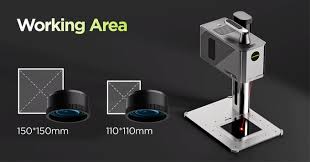In today's competitive manufacturing landscape, precision and efficiency are critical. As industries increasingly turn to laser marking technology for its versatility and accuracy, choosing the right laser marking manufacturer has become a crucial decision for businesses looking to enhance their marking processes. This guide will walk you through the essential factors to consider when selecting a laser marking manufacturer, ensuring that you make an informed choice that aligns with your operational needs.
Understanding Laser Marking Technology
Laser marking uses focused beams of light to alter the surface of a material, creating precise marks, logos, or barcodes without physical contact. The process is favored for its speed, accuracy, and ability to produce high-quality, permanent markings on various materials, including metals, plastics, and ceramics.
Key Components of Laser Marking Systems:
- Laser Source: The type of laser (fiber, CO2, or diode) affects the material compatibility and marking quality. Fiber lasers are known for their efficiency and precision, making them ideal for industrial applications.
- Marking Head: This component directs the laser beam onto the surface of the material, determining the quality of the marking.
- Control Software: User-friendly software enhances the usability of the laser marking system, allowing for easy adjustments and design input.
- Cooling System: Essential for maintaining optimal operating temperatures, ensuring the longevity and performance of the laser source.
Key Considerations When Choosing a Laser Marking Manufacturer
- Reputation and Experience:
- Research the manufacturer’s reputation in the industry. Look for reviews, case studies, and testimonials from previous clients to gauge their reliability and product quality.
- An experienced manufacturer is more likely to understand your specific needs and provide tailored solutions that fit your operational requirements.
- Product Quality:
- Investigate the quality of the laser marking machines offered by the manufacturer. Request samples or demonstrations to assess the engraving and marking quality.
- Ensure the manufacturer complies with industry standards and certifications, which can be an indicator of product reliability and performance.
- Customization and Flexibility:
- Your marking needs may vary significantly from those of other businesses. Choose a manufacturer that offers customizable solutions tailored to your specific applications, materials, and production requirements.
- Look for options in laser types, marking speeds, and software features that can be adapted to your unique business processes.
- Technical Support and Training:
- Reliable technical support is crucial for minimizing downtime and ensuring smooth operations. Assess the level of support the manufacturer provides, including installation, training, and ongoing maintenance services.
- Consider the availability of online resources, manuals, and troubleshooting guides to aid in operator training and machine management.
- Software Integration:
- The software that accompanies the laser marking machine can significantly affect its ease of use and functionality. Choose a manufacturer that offers intuitive software solutions that integrate seamlessly with your existing systems.
- Features like design templates, CAD compatibility, and real-time monitoring can enhance operational efficiency and workflow.
- Cost and Value:
- While cost is an important factor, focus on the value the machine brings to your business rather than just the initial purchase price. Compare features, capabilities, and after-sales support to make an informed decision.
- Evaluate the total cost of ownership, which includes not just the upfront cost but also maintenance, operation, and potential upgrades in the future.
- After-Sales Service and Warranty:
- A strong after-sales service can provide peace of mind. Ensure that the manufacturer offers comprehensive warranty coverage and responsive customer service for any issues that may arise after purchase.
- Understanding the terms of warranty and the availability of spare parts is essential for long-term machine performance.
Applications of Laser Marking
Laser marking technology has widespread applications across various industries, including:
- Electronics: Used for marking serial numbers, barcodes, and logos on circuit boards and components.
- Aerospace: Ideal for marking critical components to ensure traceability and compliance with regulatory standards.
- Automotive: Employed for branding, part identification, and traceability on automotive parts.
- Medical Devices: Essential for engraving information on surgical instruments and implants to meet industry regulations.
- Promotional Items: Perfect for customizing gifts and promotional products with logos and designs.
Conclusion
Choosing the right laser marking manufacturer is vital for enhancing your business’s marking capabilities. By considering factors such as reputation, product quality, customization options, technical support, and cost, you can make a well-informed decision that aligns with your operational goals. Investing in a reliable manufacturer will not only improve your marking processes but also contribute to your business's overall success and competitiveness in the market.





Comments